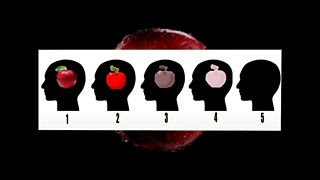Lately, fellow bookworms have been on the trend of discovering just how different other readers are in how they experience books. Some people see pictures, some short clips, and some people enjoy full on movies in their minds as they read. However, the one experience they all appear to not know about is the literal lack of any visualization at all.
I've come across multiple posts in the past month or two written by someone who has only recently come into contact with the fact that this exists. The posts all share one thing in common: their writers' minds are blown that anyone could enjoy reading fiction without being able to "see" what is described on the page.
But we can!
Let's step back slightly. What is this phenomenon? Aphantasia is the scientific term for a person who literally cannot visualize anything at all in their minds. It isn't an all or nothing type of situation, however. Full aphantasia is the state of seeing nothing, but there is a spectrum. Some might see a fuzzy shape, others a black and white image. Each person is slightly different in how and what they see.
Take a moment and try out this simple test:
Close of your eyes and think of a red apple. Make the picture as detailed as you can in your mind. Now, open your eyes. Which number of apple matches what you saw? If you picked 1, then you are perfectly normal and probably see quite detailed images as you read. If you picked 5 or closer to that end of the scale you might have partial or full aphantasia.
I've been digging more into this topic lately as I've come to realize that I also am somewhere on this spectrum. I never really had a proper term for it until I ran across a description of aphantasia online and realized it was was a tad too suitable for describing how my mind's eye worked, or rather, did not work. One example, that I can clearly remember from my youth is the the passage describing the events of Helm's Deep in Lord of the Rings. I read it multiple times before I was 10 years old but I never actually realized how much the descriptions were going over my head until the movies came out. Only then did the battle of Helm's Deep make sense because I couldn't follow the descriptions in the book at all.
My level of visualization is moderate, or at least I would classify it as such. Maybe between a 3 and 4 on the chart? However, moderate to severe might be more appropriate. I can't be quite sure. I'm extremely good at tricking myself into thinking I've seen or visualized something when all I've actually done is dredge up a nugget of knowledge for that item. Instead of seeing a red apple fully constructed mentally, the knowledge nugget tells me that an apple should be red and so therefore since I "know" that, I must have seen a red apple when I actually haven't.
If I'm being strictly honest with myself, what I "see" is vague at best with the clearest pictures being collages made from previously see objects and people mixed with knowledge nuggets to tie them all together. It is very rare that I get a fully detailed picture and it usually ends up inspiring a story. And even that is only snapshots, never a moving picture.
This limitation becomes oddly visible in my writing and reading preferences. I've always disliked books overly filled with description (fantasy I'm looking at you!) and have trended toward liking sci-fi books more and more due to how reliant they are on dialogue and action versus description. I mastered the art of skimming descriptions early on as a very misguided attempt at listening to the LoTR audiobook made clear when suddenly I discovered whole pages I had skimmed over for years! This bias shows up in my writing through the years as I used to only try to write fantasy of the high or epic variety which never worked very well and usually bombed, but now my home base is sci-fi where I can push the story along without having to do detailed world building or passages of description.
My writing style itself has always been what I would call "sketchy". Like a pencil sketch, my writing draws the framework for the story with dialogue and action while leaving out almost all description. It's only in the editing phase that people and places take on "color" as I conscientiously add in descriptions. But only some. I prefer for my stories to remain close to the framework sketch stage. It's less work for me and it leaves readers open to use their much more vivid imaginations to fill in the blanks. Or, readers like myself can enjoy a good story without unwanted fluff. I hope that defining this in my own writing I can grow as a writer and learn to make it fully into a strength. But don't expect any epic length description laden books from me. If they are extremely long, that's because the action requires the length, not the description!
Thanks for sticking around during this dive into my odd little mind. I hope it has been enlightening! Did you learn something new? Are you also cursed with a malfunctioning mind's eye? Or is yours perfectly functional? I'm curious to hear what your results of the apple test are so leave them in them in the comments below!


